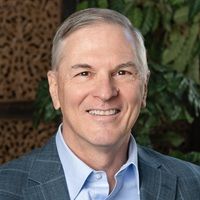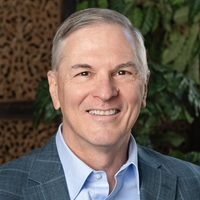The Fiduciary Firewall: An Expert's Five-Step Guide to Honest Financial Planning
Armed with education and awareness, you can avoid unethical people in the financial industry by seeking fee-only fiduciaries and sharing your knowledge with others.


Profit and prosper with the best of Kiplinger's advice on investing, taxes, retirement, personal finance and much more. Delivered daily. Enter your email in the box and click Sign Me Up.
You are now subscribed
Your newsletter sign-up was successful
Want to add more newsletters?

Delivered daily
Kiplinger Today
Profit and prosper with the best of Kiplinger's advice on investing, taxes, retirement, personal finance and much more delivered daily. Smart money moves start here.

Sent five days a week
Kiplinger A Step Ahead
Get practical help to make better financial decisions in your everyday life, from spending to savings on top deals.

Delivered daily
Kiplinger Closing Bell
Get today's biggest financial and investing headlines delivered to your inbox every day the U.S. stock market is open.

Sent twice a week
Kiplinger Adviser Intel
Financial pros across the country share best practices and fresh tactics to preserve and grow your wealth.

Delivered weekly
Kiplinger Tax Tips
Trim your federal and state tax bills with practical tax-planning and tax-cutting strategies.

Sent twice a week
Kiplinger Retirement Tips
Your twice-a-week guide to planning and enjoying a financially secure and richly rewarding retirement

Sent bimonthly.
Kiplinger Adviser Angle
Insights for advisers, wealth managers and other financial professionals.

Sent twice a week
Kiplinger Investing Weekly
Your twice-a-week roundup of promising stocks, funds, companies and industries you should consider, ones you should avoid, and why.

Sent weekly for six weeks
Kiplinger Invest for Retirement
Your step-by-step six-part series on how to invest for retirement, from devising a successful strategy to exactly which investments to choose.
The bad behavior of Wall Street firms repeatedly makes headlines.
New scandals seem to crop up every other month — instances of insider trading, mortgage fraud, market manipulation and other illegal activities that result in massive financial losses for the firms’ customers and the broader economy.
During the last 20 years, the financial sector paid a staggering $331 billion in fines for various violations. Though that number is difficult for most of us to wrap our heads around (you could buy about 165,000 basic private jets with that kind of cash), it hardly makes a dent in an industry that’s worth about $1.7 trillion.
From just $107.88 $24.99 for Kiplinger Personal Finance
Become a smarter, better informed investor. Subscribe from just $107.88 $24.99, plus get up to 4 Special Issues

Sign up for Kiplinger’s Free Newsletters
Profit and prosper with the best of expert advice on investing, taxes, retirement, personal finance and more - straight to your e-mail.
Profit and prosper with the best of expert advice - straight to your e-mail.
So, the bad behavior continues, and the consumer suffers.
The Kiplinger Building Wealth program handpicks financial advisers and business owners from around the world to share retirement, estate planning and tax strategies to preserve and grow your wealth. These experts, who never pay for inclusion on the site, include professional wealth managers, fiduciary financial planners, CPAs and lawyers. Most of them have certifications including CFP®, ChFC®, IAR, AIF®, CDFA® and more, and their stellar records can be checked through the SEC or FINRA.
Though the state of the financial industry seems grim, there is reason to hope. The Goliath Wall Street banks, brokerage firms and insurance companies can be defeated if we arm our slingshots with the right rocks.
The most powerful rock — the one that will ultimately deliver the killing blow — is consumer education.
Consumers can have a lot of power
Though the David vs Goliath analogy may seem far-fetched, entire industries have toppled because of consumer preferences and actions. Consider the decline of the fur industry or the decreasing interest in natural (as opposed to lab-grown) diamonds.
These are both cases of consumers changing their preferences and choosing to spend their money elsewhere. The same type of monumental change happened at the turn of the 21st century in the tobacco industry.
When discussing the potential for Wall Street’s transformation, I often use the tobacco industry as an example of how educated consumers can stand up to, and fundamentally change, a Goliath industry.
The tobacco industry today looks much different than it did 50 years ago. In 1965, 68% of the adult population smoked cigarettes, every bar and restaurant had a smoking section, and Big Tobacco spent many millions of dollars every year on flashy advertisements (featuring the Marlboro Man, Joe Camel and other iconic figures).
Fast-forward to the 21st century, and those statistics change drastically. In 2021, only 11.5% of the U.S. population smoked, smoking is largely banned in indoor spaces, and regulations are more stringent than ever (bans on misleading ads, mandated warning labels, steep taxes).
These changes were not initially brought about by sweeping regulatory changes or federal prohibitions. They were prompted by the consumer — the average Joes and Janes who were learning about the deadly effects of tobacco use.
A sea change for financial planning?
A similar sea change is possible in the financial planning industry. Currently, many aspects of large Wall Street firms are unregulated or open to interpretation.
For example, anyone can falsely claim to be a fiduciary financial planner, even if that person mainly works as a salesperson peddling proprietary financial products.
Another example: The compensation structure of these firms might be confusing for the consumer, with explanations of fees or commissions buried in pages of thick legal jargon.
Unfortunately, the federal government seems to have no appetite for cracking down on unethical behaviors. Money is power, and giant banks, brokerage firms and insurance companies have the money and lobbyists to influence lawmakers and large regulatory bodies such as the SEC and the Financial Industry Regulatory Authority (FINRA).
Where education comes into play
As in the parable of David and Goliath, the situation seems bleak, and the odds are stacked against the little guy. What hope does an individual investor have against a mammoth industry, armed with clout, clever marketing and cash? This is where education comes into play.
The tobacco industry started to panic when consumers began learning about the ill effects of cigarettes. Numerous health-related educational campaigns aired on TV (including one featuring a former Marlboro Man who had developed lung cancer), medical research demonstrated smoking’s devastating effects, and schools began incorporating tobacco education into their health programs.
In the late ’90s, a major lawsuit was brought against the tobacco industry, which resulted in a $206 billion settlement involving 46 states. Only after consumers demanded change did the federal government significantly increase its regulations on the tobacco industry.
In the world of financial planning, individual consumers are starting to grow savvier. Only a few years back, it was rare for an individual investor to ask me if I am a professional fiduciary or if my firm is strictly fee-only. Today, I get these questions regularly.
Looking for expert tips to grow and preserve your wealth? Sign up for Building Wealth, our free, twice-weekly newsletter.
However, we still have a long way to go. Misinformation abounds, and many consumers are just as confused and mistrustful as ever, and rightfully so. With so many charlatans claiming to be fiduciaries, or touting their “fee-based” services, it’s difficult to know who to trust.
Just as David selected five rocks for his slingshot in his battle with Goliath, I suggest these five AdvisorSmart® tips for empowering and educating consumers (Note: I am the founder of AdvisorSmart, a research institute with a mission to help investors obtain better financial advice):
1. Seek fee-only financial advisors
The terminology related to financial planning compensation models can be confusing and opaque. I like to use the National Association of Personal Financial Advisors’ (NAPFA) definition for fee-only financial advisors, which is “…one who is compensated solely by the client with neither the advisor nor any related party receiving compensation that is contingent on the purchase or sale of a financial product.”
On the other hand, dually registered (“two-hat”), fee-based financial brokers/advisors and brokers can potentially earn revenue through commissions or bonuses, on top of charging a basic fee for services.
Because of these incentives, conflicts of interest can (and do) arise. Any financial planner who is expected to make sales that ultimately benefit their company can never be completely unbiased.
In short, fee-only financial advisors are more likely to approach financial planning with a relatively unbiased lens, since they are not incentivized to make sales.
2. Conduct smart searches
For the typical consumer, searching for a true fee-only financial advisor can be frustrating. Any financial advisor can claim to be fee-only, even if they are not. There are no laws or regulations against this misleading behavior.
Furthermore, big banks and brokerage firms are more likely to have deep pockets and can pay to appear at the top of a Google search. What’s an individual investor to do?
In my experience, one of the best ways to search for fee-only financial advisors is through NAPFA’s Find an Advisor platform. There, you can search for fee-only advisors who are affiliated with NAPFA, the largest professional association of fee-only financial advisors in the nation.
Any financial advisor who wants to join NAPFA must comply with a strict code of ethics, renew a fiduciary oath every year and, of course, operate under a fee-only model.
You could also use a reliable matching platform — one that pairs consumers with fee-only financial advisors. Although most matching platforms or directories pull from a wide pool, a few have opted to promote only fee-only financial advisors.
I recommend using Wealthramp or FeeOnlyNetwork for your search.
3. Do your research
Once you’ve made a list of potential fee-only financial advisors, it is prudent to thoroughly research the advisor and their firm. Read the firm’s mission statement, look through any disclosures posted on their website and look for adherence to a fiduciary standard of care.
Search for reviews from past clients, preferably posted on independent websites. It is also important to review the advisor’s ADV (an SEC-mandated disclosure form) and disciplinary history for anything odd or questionable. You can find information about these disclosures at the SEC’s Investment Adviser Public Disclosure website.
4. Request a fiduciary oath
Professional investment fiduciaries are obligated to uphold a fiduciary standard of care, which means they must put their clients’ interests before their own.
Any true fiduciary will acknowledge this essential duty in writing with a fiduciary oath.
On the other hand, those who falsely claim to be a fiduciary will likely refuse to sign a fiduciary oath. This is one of the easiest ways to identify a charlatan.
You can see a sample fiduciary oath on NAPFA’s website.
5. Educate others
Education is a gift that can keep on giving. To truly start a movement that empowers individual investors and defeats the Goliath Wall Street firms, it is important to talk with your family members, friends and loved ones about the pitfalls of commission-based financial advisors and firms, the reasons to choose fee-only financial advisors and how to search for a trustworthy financial advisor.
I recommend sharing NAPFA’s website, passing along this article and talking openly (and regularly) about this important topic.
Armed with education, we can outsmart the giant.
Related Content
- The Financial Fiduciary Standard Explained
- 11 Questions to Ask When Choosing a Fiduciary Adviser
- Three Ways Fiduciary Financial Planners Put You First
- How to Find a Financial Adviser for Retirement Planning
Profit and prosper with the best of Kiplinger's advice on investing, taxes, retirement, personal finance and much more. Delivered daily. Enter your email in the box and click Sign Me Up.

David Bromelkamp is an investor advocate and the founder of AdvisorSmart®, which was established in 2018 to provide investors with the education they need to access better financial advice. Sometimes referred to as the "Jerry Maguire of Financial Advice," he is passionate about objective financial advice and is leading the charge to educate investors about the best approach to finding and retaining objective, fee-only fiduciary financial advisors. His first book, AdvisorSmart for the Individual Investor: Your Guide to Selecting a Financial Advisor to Get Better Financial Advice, was released in April 2025 to arm consumers with the knowledge they need to succeed.
-
 Quiz: Do You Know How to Avoid the "Medigap Trap?"
Quiz: Do You Know How to Avoid the "Medigap Trap?"Quiz Test your basic knowledge of the "Medigap Trap" in our quick quiz.
-
 5 Top Tax-Efficient Mutual Funds for Smarter Investing
5 Top Tax-Efficient Mutual Funds for Smarter InvestingMutual funds are many things, but "tax-friendly" usually isn't one of them. These are the exceptions.
-
 AI Sparks Existential Crisis for Software Stocks
AI Sparks Existential Crisis for Software StocksThe Kiplinger Letter Fears that SaaS subscription software could be rendered obsolete by artificial intelligence make investors jittery.
-
 Quiz: Do You Know How to Avoid the 'Medigap Trap?'
Quiz: Do You Know How to Avoid the 'Medigap Trap?'Quiz Test your basic knowledge of the "Medigap Trap" in our quick quiz.
-
 5 Top Tax-Efficient Mutual Funds for Smarter Investing
5 Top Tax-Efficient Mutual Funds for Smarter InvestingMutual funds are many things, but "tax-friendly" usually isn't one of them. These are the exceptions.
-
 Why Invest In Mutual Funds When ETFs Exist?
Why Invest In Mutual Funds When ETFs Exist?Exchange-traded funds are cheaper, more tax-efficient and more flexible. But don't put mutual funds out to pasture quite yet.
-
 We Retired at 62 With $6.1 Million. My Wife Wants to Make Large Donations, but I Want to Travel and Buy a Lake House.
We Retired at 62 With $6.1 Million. My Wife Wants to Make Large Donations, but I Want to Travel and Buy a Lake House.We are 62 and finally retired after decades of hard work. I see the lakehouse as an investment in our happiness.
-
 Social Security Break-Even Math Is Helpful, But Don't Let It Dictate When You'll File
Social Security Break-Even Math Is Helpful, But Don't Let It Dictate When You'll FileYour Social Security break-even age tells you how long you'd need to live for delaying to pay off, but shouldn't be the sole basis for deciding when to claim.
-
 I'm an Opportunity Zone Pro: This Is How to Deliver Roth-Like Tax-Free Growth (Without Contribution Limits)
I'm an Opportunity Zone Pro: This Is How to Deliver Roth-Like Tax-Free Growth (Without Contribution Limits)Investors who combine Roth IRAs, the gold standard of tax-free savings, with qualified opportunity funds could enjoy decades of tax-free growth.
-
 One of the Most Powerful Wealth-Building Moves a Woman Can Make: A Midcareer Pivot
One of the Most Powerful Wealth-Building Moves a Woman Can Make: A Midcareer PivotIf it feels like you can't sustain what you're doing for the next 20 years, it's time for an honest look at what's draining you and what energizes you.
-
 Stocks Make More Big Up and Down Moves: Stock Market Today
Stocks Make More Big Up and Down Moves: Stock Market TodayThe impact of revolutionary technology has replaced world-changing trade policy as the major variable for markets, with mixed results for sectors and stocks.